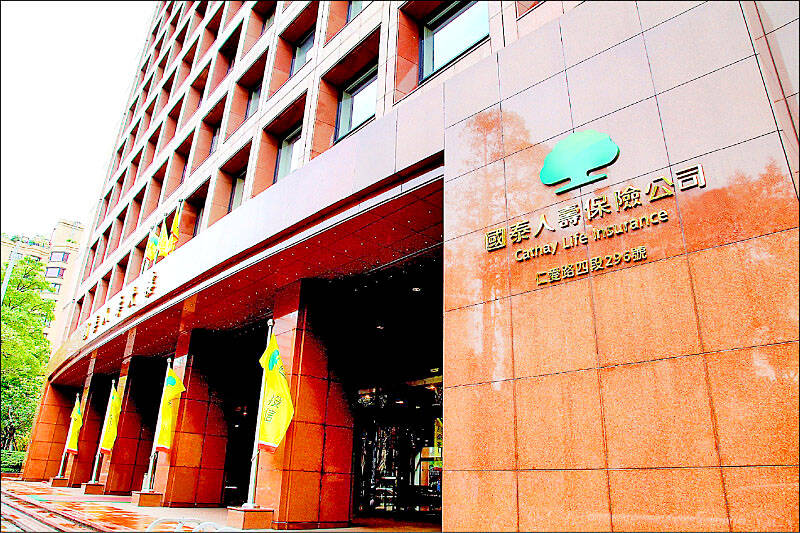A surge in insurance sales in Taiwan is threatening to spur an increase in capital outflows, potentially dragging the New Taiwan dollar to levels seen during the global financial crisis.
Sales of insurance policies in Taiwan rose to more than NT$100 billion (US$3.05 billion) in December last year, the highest for a month since January 2022, Taiwan’s Insurance Institute data released last week showed.
The demand was mainly driven by better returns on the products compared with banks’ foreign-currency deposits.

Photo courtesy of Cathay Life Insurance Co
Analysts are concerned that Taiwan’s NT$1 trillion life insurance industry, which has been piling into overseas assets due to the lack of high-yielding fixed-income instruments at home, will accelerate those investments.
Such a move would result in heavy capital outflows and weigh on the NT dollar.
“With more policies being sold, there will also be more investment from Taiwanese lifers in dollar-denominated products, such as US bonds and dividend stocks, as these offer quite competitive yields compared to local and regional fixed income products,” said Lynn Song (宋林), an economist at ING Bank NV.
“In a vacuum, it is another factor adding to Taiwan dollar depreciation pressure over the medium term,” Song said.
The NT dollar is already weakening due to the threat of a global trade war and the nation’s large interest-rate discount to the US.
Earlier this year, the currency fell below the key psychological level of US$33 for the first time in nine years and has trailed behind most of its North Asian peers in performance so far this year.
“We see it testing the bottom of 34-35 versus the dollar this year, at least,” said Stephen Chiu (趙志軒), chief Asian foreign-exchange and rates strategist at Bloomberg Intelligence.
Those are levels seen during the global financial crisis in 2009. A weaker currency is favorable for Taiwan’s export-oriented economy, but the central bank intervened this month to stabilize the market.
President William Lai (賴清德) also vowed to keep forex, the interest rate and inflation stable amid rising geopolitical tensions.
The NT dollar is losing another pillar of support. Local insurers typically short the greenback against the NT dollar in the non-deliverable forwards market to hedge against a stronger local currency.
Expectations for Taiwan’s currency to eventually weaken closer to US$34 is limiting insurers’ hedging activity, said Ju Wang (王菊), head of regional foreign-exchange and rates strategy at BNP Paribas in Hong Kong.

SEEKING CLARITY: Washington should not adopt measures that create uncertainties for ‘existing semiconductor investments,’ TSMC said referring to its US$165 billion in the US Taiwan Semiconductor Manufacturing Co (TSMC, 台積電) told the US that any future tariffs on Taiwanese semiconductors could reduce demand for chips and derail its pledge to increase its investment in Arizona. “New import restrictions could jeopardize current US leadership in the competitive technology industry and create uncertainties for many committed semiconductor capital projects in the US, including TSMC Arizona’s significant investment plan in Phoenix,” the chipmaker wrote in a letter to the US Department of Commerce. TSMC issued the warning in response to a solicitation for comments by the department on a possible tariff on semiconductor imports by US President Donald Trump’s

The government has launched a three-pronged strategy to attract local and international talent, aiming to position Taiwan as a new global hub following Nvidia Corp’s announcement that it has chosen Taipei as the site of its Taiwan headquarters. Nvidia cofounder and CEO Jensen Huang (黃仁勳) on Monday last week announced during his keynote speech at the Computex trade show in Taipei that the Nvidia Constellation, the company’s planned Taiwan headquarters, would be located in the Beitou-Shilin Technology Park (北投士林科技園區) in Taipei. Huang’s decision to establish a base in Taiwan is “primarily due to Taiwan’s talent pool and its strength in the semiconductor

An earnings report from semiconductor giant and artificial intelligence (AI) bellwether Nvidia Corp takes center stage for Wall Street this week, as stocks hit a speed bump of worries over US federal deficits driving up Treasury yields. US equities pulled back last week after a torrid rally, as investors turned their attention to tax and spending legislation poised to swell the US government’s US$36 trillion in debt. Long-dated US Treasury yields rose amid the fiscal worries, with the 30-year yield topping 5 percent and hitting its highest level since late 2023. Stocks were dealt another blow on Friday when US President Donald

UNCERTAINTY: Investors remain worried that trade negotiations with Washington could go poorly, given Trump’s inconsistency on tariffs in his second term, experts said The consumer confidence index this month fell for a ninth consecutive month to its lowest level in 13 months, as global trade uncertainties and tariff risks cloud Taiwan’s economic outlook, a survey released yesterday by National Central University found. The biggest decline came from the timing for stock investments, which plunged 11.82 points to 26.82, underscoring bleak investor confidence, it said. “Although the TAIEX reclaimed the 21,000-point mark after the US and China agreed to bury the hatchet for 90 days, investors remain worried that the situation would turn sour later,” said Dachrahn Wu (吳大任), director of the university’s Research Center for